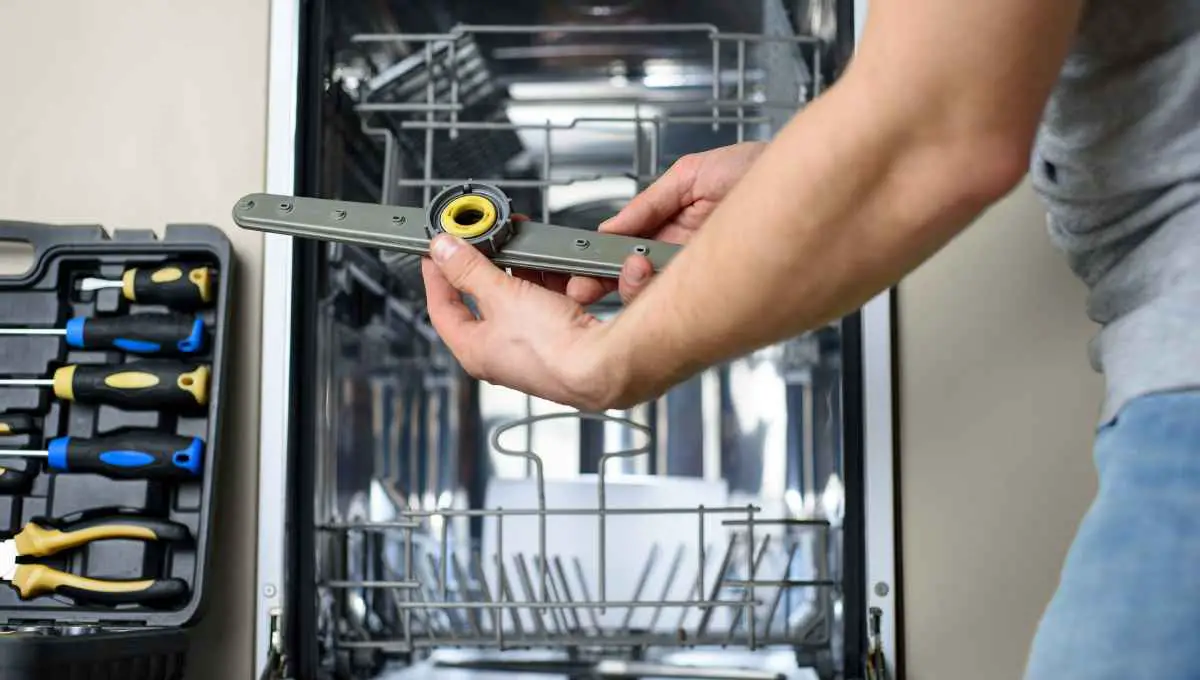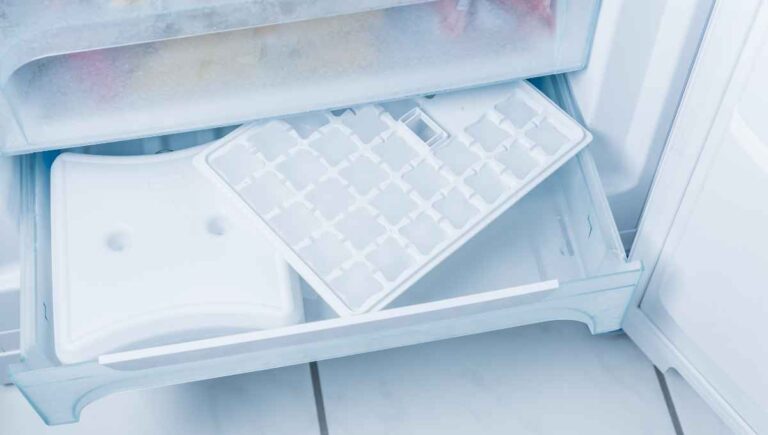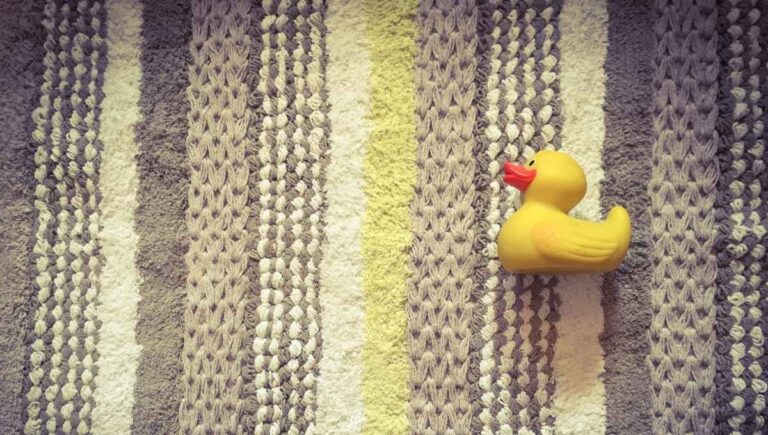Do Dishwasher Pods Clog Drains? (How to Prevent Drain Clogs)

Using dishwasher pods is so convenient! Just pop a pod into the soap compartment, close the lid, choose a setting, and presto, clean dishes! But, if you notice that your dishwasher is draining slowly, you may be wondering if dishwasher pods clog drains or not.
As long as you’re using hot water, dishwasher pods will not clog your drain. In fact, the degreaser in your dishwasher pod may even help clean out your drain and help break down clogs!
Of course, if your pods aren’t dissolving properly, it can lead to problems. This is just one of the caveats we’ll discuss in this article, so stick with us while we go over dishwasher pods!
This post contains affiliate links. This means Household Blogger may earn a commission should you make a purchase using any of our links. Please refer to our full affiliate disclosure policy for full details.
Here’s a Quick Pro Tip!
Nobody wants to deal with clogs in their drains. If this is something you struggle with, you’ve probably changed everything you clean with in hopes it stops the clogs. But, unfortunately, if it’s already clogged, changing your detergent won’t help.
If you’ve got stubborn clogs, try one of these options to get clear-flowing drains once again:
1. Drain Clog Remover – For heavy-duty clogs.
2. Drain Snakes – Perfect for removing tough hair build-up!
3. Auger – If all else fails, this auger will remove the clog!
Dishwasher Pods
While dishwasher pods are very convenient, if you think they’re clogging your pipes, you may choose to steer clear of them.
But is it really causing a clog in your dishwasher’s pipes? Let’s discuss it!
Can Dishwasher Tablets Clog Pipes?
Because dishwasher tablets are designed to break down grease and dissolve completely in water, it is highly unlikely they are clogging your pipes. However, if your pipes are clogged, it may be food residue.
If you’re having issues with clogged pipes, food or hair is most likely causing the clog. Either way, using a drain clog remover is your best bet to clear the clog.
Additionally, your dishwasher tablets may also help clear the pipes because of their degreaser components.
Do Dishwasher Pods Dissolve?
Dishwasher pods are designed to dissolve completely in hot water. They then break down food and grease in order to clean your dishes. Due to these components, it’s not likely they will cause clogs in your drains.
If, however, you don’t rinse the food residue from your dishes before they go in the dishwasher, the remaining solids may get rinsed down your drain and cause a clog.
This is why it’s always recommended you scrape and rinse plates before they go in the dishwasher.
Do Dishwasher Cleaner Pods Clog up Drains?
Dishwasher cleaner pods have not been found to clog up drains. In fact, most cleaner pods contain a degreaser, which may actually help clear out drains. As long as you are using hot water to run your dishwasher, you should have no problems with pods.
However, most dishwasher pods are not designed to dissolve in cold water.
So if you notice that your pods are not completely dissolving, you may need to check your hot water and dishwasher to make sure nothing is wrong.
How Do You Fix a Drain Clogged by a Dishwasher Pod?
If a dishwasher pod is truly causing the clog, it is most likely because the pod didn’t completely dissolve. To dissolve the pod, try flushing your drain with hot water for 15-20 minutes.
If flushing with hot water didn’t work, you might have other residue causing the blockage. You can use a clog remover to try and break up the clog.
Simply pour the clog remover slowly down the drain, allow it to sit for 15 minutes, then rinse with hot water.
Do Dishwasher Pods Stop up Drains?
Dishwasher pods do not stop up drains when used correctly. However, as long as your dishwasher utilizes hot water, the pods should dissolve completely and cannot cause a clog.
In fact, the degreaser in dishwasher pods should help prevent and eliminate clogs from happening in your drains.
But, of course, they work best when used in hot water, as the heat helps them dissolve completely.
Dishwasher Woes
We get it if you are considering using dishwasher pods but are concerned about whether they will harm your dishwasher.
Your new washer was expensive, and you want to keep it in good shape. But don’t worry. Pods won’t hurt your dishwasher. Let’s talk more about it!
Are Pods Good for Dishwashers?
Using dishwasher pods in your dishwasher is neither good nor bad for the dishwasher as long as you use them properly. Though, when used with hot water, the dishwasher pods can be good for your drains, as the degreaser can help prevent clogs.
The only time pods aren’t good for your dishwasher is if you use the wrong pods, for example, laundry pods.
Laundry soap acts differently than dish soap and will not be good for your dishwasher.
Can Pods Ruin Your Dishwasher?
Dishwasher pods will not ruin your dishwasher as long as you use them correctly. Only use one at a time, and do not use a ‘quick cycle.’ The water needs to get hot enough to dissolve the pods completely.
If you notice build-up or problems in your dishwasher, the pods may not dissolve properly. First, check your dishwasher to ensure your water is getting hot enough.
If you use more than one pod at once, consider cutting down to one pod.
Do Dishwasher Pods Cause Problems?
Dishwasher pods only cause problems if the water used in the dishwasher isn’t hot enough to dissolve the pods fully or if you’re misusing the pods. Make sure you have put the pod in the proper place and are only using the recommended amount of pods (usually one.)
The biggest problem people encounter using dishwasher pods is finding that the pod didn’t dissolve completely. There are two main reasons for this.
The first is that the cycle wasn’t long enough for the pod to dissolve. The second is that the water in your washing machine didn’t get hot enough to dissolve the pod.
Are Dishwasher Pods Bad for the Dishwasher?
As long as you only use one pod at a time, it shouldn’t be bad for your dishwasher. Pods are designed to break down quickly in hot water, and the detergent often contains a degreaser, which is unlikely to clog.
However, if you find that your dishwasher pods aren’t breaking down completely and leaving build-up, consider switching to a liquid dishwasher soap for a while to ensure the drain doesn’t clog up.
Does Dishwasher Detergent Block the Drain?
Your dishwasher detergent should not block up your dishwasher drains. Dishwasher detergents contain a degreaser designed to break down food solids and grease, so it should help unclog your drain, not block it worse.
If you’re noticing your drains are clogged, and you think detergent might be to blame, flush your drains with hot water for at least fifteen minutes.
After that, simply running your hot water should be enough, though you can (carefully!) add boiling water. This should dissolve any residual detergent.
Plastic
If you use dishwasher pods, you’ve probably noticed the coating surrounding the detergent. But what exactly is it? It looks like plastic, but is it really? We’ll talk about that right now!
What Happens to the Plastic on Dishwasher Pods?
If your dishwasher pods are individually wrapped in plastic, you need to unwrap them and throw away the plastic before using the pod. If your pods aren’t individually wrapped, the covering on the pod isn’t plastic like you may think.
In fact, the covering on dishwasher pods is actually Polyvinyl alcohol or PVA. PVA is a water-soluble synthetic polymer designed to dissolve upon contact with water.
It protects the pod’s detergent until the hot water from your dishwasher dissolves it.
Where Does the Plastic From Dishwasher Pods Go?
Unless your dishwasher pods are individually wrapped, they do not have the usual plastic on them. If they are individually wrapped, remove the plastic before placing them in the dishwasher. Otherwise, the covering is polyvinyl alcohol and will dissolve in water.
The Polyvinyl alcohol will dissolve upon contact with water and will simply rinse down the drain along with the soap during your dishwasher’s rinse cycle.
If you notice any residue from the dishwasher pods, you may need to check how hot your water is.
Do Dishwasher Pods Contain Plastic?
Dishwasher pods are covered in polyvinyl alcohol, a water-soluble synthetic polymer, technically a type of plastic. This polymer is designed specifically to dissolve in water.
The solution will flush down your septic system when your dishwasher completes its rinse cycle. So as long as your dishwasher is using hot water to wash your dishes, this polymer shouldn’t cause any issues to the dishwasher.
Do You Have to Unwrap Dishwasher Pods?
Some dishwasher pods come individually wrapped in order to prevent sticking or accidental contact with water. If they are individually wrapped, you must unwrap them before using them in the dishwasher.
If, however, they are not individually wrapped but seem to have a film over the liquid, that is polyvinyl alcohol covering and shouldn’t be removed.
Instead, the hot water from your dishwasher will dissolve that coating and allow your dishwasher pod to do its job.
Liquid vs. Pods
There is great debate over which is better to use in your dishwasher, liquid detergent or detergent pods. Both have their advantages and disadvantages. Let’s talk about them now!
Is Liquid Detergent Better Than Pods?
It’s a matter of personal preference, but most people agree that the pods are some of the best (and cleanest) options for dishwasher detergent. In addition, because detergent pods are self-contained, you don’t have to worry about using too much or too little liquid when setting up the dishwasher to run.
Of course, if you’re a die-hard liquid detergent fan, keep doing what you’re doing! Just make sure you’re measuring out the correct amount of liquid, so your dishes get clean.
Otherwise, use your pods to pre-treat, degrease and rinse all in one!
Are Dishwasher Pods Better Than Liquid?
Because dishwasher pods contain a pre-treat, a degreaser, and a soap all in one, it’s often argued that they are better. Plus, they’re premeasured, so you never have to worry about using too much or too little soap.
Though, some are concerned about using plastics as a cover for dishwasher pods. Plus, if your dishwasher doesn’t use hot water or if you only use quick washes, there are times the pods may not dissolve completely.
Why Shouldn’t You Use Dishwasher Pods?
You shouldn’t use dishwasher pods if you always wash your dishes on a quick wash cycle or if you use cold water. These options greatly decrease the pod’s ability to dissolve, which means they can’t clean as well.
Otherwise, there are no reasons you shouldn’t use dishwasher pods. They give you a premeasured amount of dishwasher detergent, so you don’t have to worry about using too much or too little.
Does Liquid Soap Clog the Drain?
Liquid soap should not clog the drains in your dishwasher. Similar to the pods, the degreaser in your soap should have the opposite effect; it should help your drains keep clean.
If you notice clogs after cleaning dishes, you may not be rinsing your dishes well enough, and food residue is clogging the drain. If this is the case, you may need to use a drain cleaner and rinse with hot water.
You might also enjoy our post on How to Fix a Gurgling Kitchen Sink
Related Questions
What Can I Use Instead of a Dishwasher Pod?
Consider using a liquid or gel alternative if you need to clean your dishes but are out of dishwasher pods. You can also use equal parts dish soap combined with baking soda in a pinch.
We do not recommend you use different pods in your dishwasher. For example, using a laundry pod will lead to abundant suds and may harm your dishwasher.
If you do not have dish soap, it’s better to let the dishes soak and pick up some soap next time you’re at the market.
Where Do You Put Dishwasher Pods?
Dishwasher pods go in the same slot where you would put a liquid or gel dish soap in a dishwasher. Once the water hits the pod, it will dissolve and disperse just as a liquid would. So do not just throw the pod into the dishwasher.
You do not need to puncture the outer shell of the dishwasher pods before placing them in the dishwasher’s wash compartment, though you should still close the lid of the compartment as you would with liquid.
Do Tide Pods Clog Washing Machines?
Tide pods will not clog washing machines as long as they’re used correctly. Similar to dishwasher pods, the coating of a Tide pod is designed to dissolve when it comes into contact with water.
If you use multiple Tide pods at once, or if you are using cold water to wash your clothes, you may have a clog forming. Though, if you do prefer cold water, there are Tide pods designed for just that!
Final Thoughts
As long as you use dishwasher pods correctly, that is, putting them in the main soap compartment and using hot water to clean your dishes, you shouldn’t have to worry about clogs.
We hope this information helps you next time you’re worried about clogs in your dishwasher!











